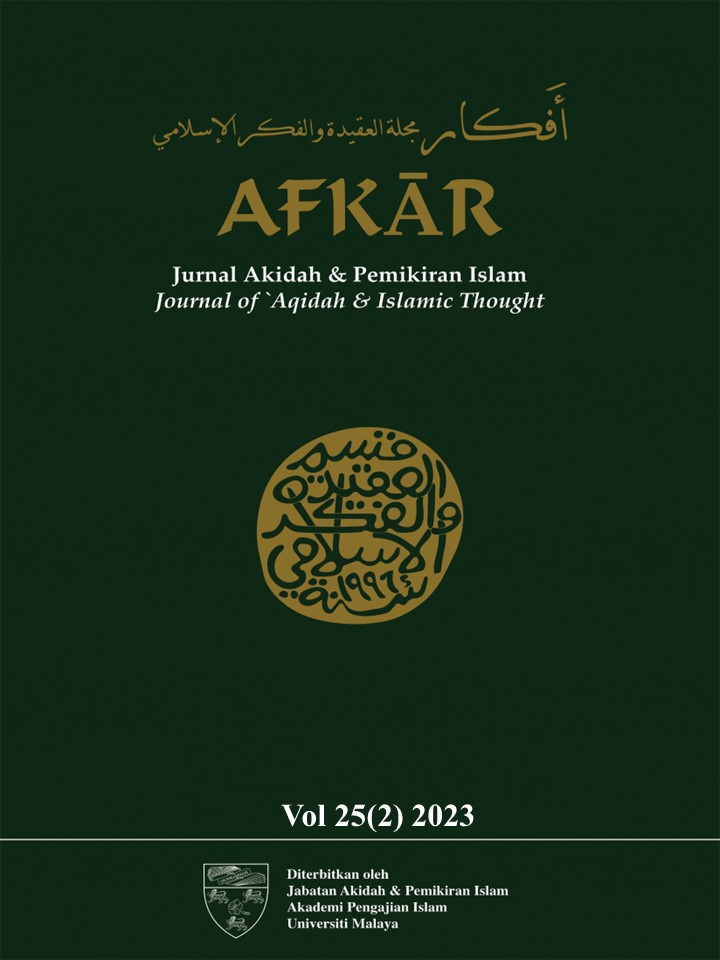Politik Islam dalam Konteks Tunisia Pasca Revolusi Jasmine: Analisis Pemikiran Rashid Ghannoushi Political Islam in The Post-Jasmine Revolution Context of Tunisia: Analyzing the Thoughts of Rashid Ghannoushi
Main Article Content
Abstract
Tunisia has a unique experience as the first Arab country to spark the Arab Spring. This uprising was filled with a series of anti-government protests called the Jasmine Revolution. In that situation, Rashid Ghannoushi, the head of the Islamic Movement in Tunisia (Al-Nahdah) was also involved in the situation by putting his perspective based on the party’s Islamic agenda. So, the objective of this article is to trace the political thought of Rashid Ghannoushi in achieving political goals through the framework of Islamic politics. This is because the results of his thought on political Islam show a significant difference with other Islamic movements especially in the context of managing power sharing. The results of the study found that his political views take into account local factors such as autocratic leadership and the secular doctrine of laicite, that inspired him to consider between the ideal of Islamic doctrine and the realistic of the atmosphere and situation in Tunisia.
Downloads
Article Details

This work is licensed under a Creative Commons Attribution-NonCommercial 4.0 International License.
References
Abdul Rahman Haji Abdullah. Pemikiran Islam Masa Kini: Sejarah dan Aliran. Kuala Lumpur: Dewan Bahasa dan Pustaka, 1987.
Affan, Mohammad. Secularism Confronts Islamism: Divergent Paths of Transitional Negotiations in Egypt and Tunisia. London and New York: Taylor & Francis, 2022.
Alisakun, Shakira. “Islam and Democracy: A Study on Rachid Ghannouchi’s Views.” TAFHIM: IKIM Journal of Islam and the Contemporary World 13(2) (2020): 29-35.
Alvi, Hayat. The Political Economy and Islam of the Middle East: The Case of Tunisia. New York: Springer International Publishing, 2019.
Al-Zinki, Salih Qadir. “Al-Ahkam al-Shar’iyyah Bayn al-Thabat wa al-Taghayyur.” Jurnal Fiqh 1 (2004): 95-124.
Boulby, Marion. “The Islamic Challenge: Tunisia since Independence.” Third World Quarterly 10(2) (1988): 590-614.
Breger, Marshall J. “How Arabs Fight Islamism.” National Interest 73 (2003): 117-24.
Brown, L. Carl. “Bourguiba and the Bourguibism Revisited: Reflections and Interpretation.” Middle East Journal 55(1) (2001): 43-57.
Buehler, Matt. Why Alliances Fail: Islamist and Leftist Coalitions in North Africa. New York: Syracuse University Press, 2018.
El-Khawas, Mohamed A. “Tunisia’s Jasmine Revolution: Causes and Impact.” Mediterranean Quarterly 23(4) (2012): 1-23.
Esposito, John L. The Islamic Threat: Myth or Reality. New York & Oxford: Oxford University Press, 1992.
Esposito, John L., Tamara Sonn & John O. Voll. Islam and Democracy after the Arab Spring. Oxford: Oxford University Press, 2016.
Ferjani, Muhammad Sayyid, “Politik Islam Pasca Arab Spring di Negara Umat Islam: Bagaimana Penglibatan Berkesan Politik Islam dalam Kerangka Negara dan Kedaulatan Undang-Undang.” Kertas kerja, NUNJI 15, Shah Alam, 2015.
Feuer, Sarah J. Regulating Islam: Religion and the State in Contemporary Morocco and Tunisia. Cambridge: Cambridge University Press, 2018.
Ghannouchi, Rached. “Ennahda’s Democratic Commitments and Capabilities: Major Evolutionary Moments and Choices.” In Democratic Transition in the Muslim World. New York: Columbia University Press, 2018: 15-28.
Ghannouchi, Rached. “From Political Islam to Muslim Democracy: The Ennahda Party and the Future of Tunisia.” Foreign Affairs 95(5) (2016): 58-67.
Ghannouchi, Rached. “Islam and Democracy in Tunisia.” Journal of Democracy 29(3) (2018): 5-8.
Ghannouchi, Rachid. “The Participation of Islamists in a Non-Islamic Government,” In Power-Sharing Islam, ed. & trans. Azzam Tamimi. London: Liberty for Muslim World, 1993: 51-63.
Ghannoushi, Rashid. Al-Dimuqratiyyah wa Huquq al-Insan fi al-Islam. Qatar: Aljazeera Center for Studies, 2012.
Ghannoushi, Rashid. Al-Hurriyat al-‘Ammah fi al-Dawlah al-Islamiyyah. Beirut: Markaz al-Dirasat al-Wahdah al-‘Arabiyyah, 1993.
Ghazali, Mohd Rumaizuddin. "Pengamalan Demokrasi Di Dunia Islam Menurut Perspektif Islam." ‘Abqari Journal 10(1) (2017): 17-34.
Grami, Amel. “The Debate on Religion, Law and Gender in Post-Revolution Tunisia.” Philosophy & Social Criticism 40(4-5) (2014): 391-400.
Haykal, Muhamad Khayr. Al-Jihad wa al-Qital fi al-Siyasah al-Shar‘iyyah. Beirut: Dar al-Bayariq, 1996.
Halverson, J. R. & N. Greenberg. Islamists of the Maghreb. London: Taylor & Francis, 2017.
Hamdi, Mohamed Elhachmi. The Politicisation of Islam: A Case Study of Tunisia. London: Taylor & Francis, 2018.
Haugbølle, Rikke Hostrup & Francesco Cavatorta. "Islamism in Tunisia Before and After the Arab Spring.” Dalam Popular Protest in the New Middle East: Islamism and Post-Islamist Politics, ed. Are Knudsen & Basem Ezbidi, London: I.B. Tauris, 2014: 31-60.
Hazbun, Waleed. “Rethinking Anti-Colonial Movements and the Political Economy of Decolonization: The Case of Tunisia.” Arab Studies Quarterly 16(1) (1994): 77-107.
Hopwood, Derek. Habib Bourguiba of Tunisia: The Tragedy of Longevity. London: Palgrave Macmillan, 1992.
Jebnoun, Noureddine. “Tunisia at the Crossroads: An Interview with Sheikh Rachid Al-Ghannouchi.” ACMCU Occasional Papers, 2014.
M. Zaidi, A. Rahman & R. Sulong R. Hisyamudin. “Pengaruh Perubahan dalam Pembinaan Hukum Siyasah Syar’iyyah.” Jurnal Syariah 16(1) (2008): 17-31.
Makmor Tumin & Mazlan Che Soh. “Sumbangan Tradisi Barat dan Islam Terhadap Idea Masyarakat Sivil,” Afkar: Jurnal Akidah & Pemikiran Islam 22(2) (2020): 77-118.
Marks, Monica. “Tunisia.” Dalam Rethinking Political Islam, ed. S. Hamid & W. McCants. Oxford: Oxford University Press, 2017: 32-53.
Netterstrøm, Kasper Ly. “After the Arab Spring: The Islamists’ Compromise in Tunisia.” Journal of Democracy 26(4) (2015): 110-124.
Saeed, Abdullah. Islamic Thought: An Introduction. Oxon: Routledge, 2006.
Shahin, Emad Eldin. Political Ascent: Contemporary Islamic Movements in North Africa. Colorado: Westview Press, 1998.
Sofi, Mohammad Dawood. Rāshid Al-Ghannushi: A Key Muslim Thinker of the 21st Century. Singapore: Palgrave, 2018.
Tamimi, Azzam S. “Rashid Al-Ghannushi.” Dalam Key Islamic Political Thinkers, ed. John L. Esposito & Emad El-Din Shahin: Oxford University Press, 2018.
Tamimi, Azzam S. Rachid Ghannouchi: A Democrat within Islamism. London: Oxford University Press, 2001.
Tamimi, Azzam S. Rachid Ghannouchi: A Democrat within Islamism. Oxford: Oxford University Press, 2001.
Willis, Micheal J. Politics and Power in the Maghreb: Algeria, Tunisia and Morocco from Independence to the Arab Spring. Oxford: Oxford University Press, 2014.
Wolf, Anne. Political Islam in Tunisia: The History of Ennahda. Oxford University Press, 2017.
Zulkifli Hasan. “Keselarian Antara Demokrasi dan Islam.” Jurnal Islam dan Masyarakat Kontemporari 13 (2016): 58-76.
Zulkifli Hasan. “Konsep Negara Madani Menurut Rashid Ghannoushi.” Dalam Rashid Ghannoushi Intelektual-Reformis Gerakan Islam, ed. Zulkifli Hasan. Kuala Lumpur: ABIM, 2013: 22-40.

